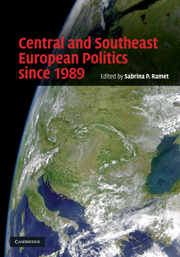Book contents
- Frontmatter
- Contents
- List of figures and maps
- List of tables
- Notes on the contributors
- Preface
- List of acronyms and abbreviations
- Guide to pronunciation of Central and Southeast European words
- 1 Central and Southeastern Europe, 1989
- 2 Central and Southeastern Europe, 2009
- Part 1 Introduction
- Part 2 Issues
- Part 3 Central Europe
- 7 Poland since 1989: muddling through, wall to wall
- 8 Building democratic values in the Czech Republic since 1989
- 9 Slovakia since 1989
- 10 Hungary since 1989
- Part 4 Yugoslav Successor States
- Part 5 Southeastern Europe
- Part 6 Former Soviet republics
- Part 7 Present and future challenges
- Index
- References
7 - Poland since 1989: muddling through, wall to wall
Published online by Cambridge University Press: 05 June 2012
- Frontmatter
- Contents
- List of figures and maps
- List of tables
- Notes on the contributors
- Preface
- List of acronyms and abbreviations
- Guide to pronunciation of Central and Southeast European words
- 1 Central and Southeastern Europe, 1989
- 2 Central and Southeastern Europe, 2009
- Part 1 Introduction
- Part 2 Issues
- Part 3 Central Europe
- 7 Poland since 1989: muddling through, wall to wall
- 8 Building democratic values in the Czech Republic since 1989
- 9 Slovakia since 1989
- 10 Hungary since 1989
- Part 4 Yugoslav Successor States
- Part 5 Southeastern Europe
- Part 6 Former Soviet republics
- Part 7 Present and future challenges
- Index
- References
Summary
Overnight, the poster was plastered on walls all over the country. As Poles on 4 June 1989, went to vote in their first, if semi-free, genuine elections in fifty years, the stern face of Gary Cooper, walking to the showdown in “High Noon” stared at them. But this time, the actor had a bright-red Solidarity badge in his lapel, and in his hand, instead of a gun, was a ballot. Naïve and powerful at the same time, the poster expressed well how Poles felt about the elections: a showdown between the forces of good, armed only with their moral right, and the forces of evil, which finally would have to concede defeat. Though communism was already starting to crumble all around them, Poland would be the first to go.
It had not been easy. Earlier that year, two and a half months of negotiations between the communist military authorities and the independent Solidarity trade union which the coup of December 1981 had driven underground, had produced a compromise. The “Round Table deal” made the union legal again, and allowed it to have its own media: Gazeta Wyborcza, daily, which proudly claimed to be “the first free newspaper between the Elbe and Vladivostok,” started publishing barely two weeks after the deal was made, capitalizing on the extensive experience of the union's underground press.
- Type
- Chapter
- Information
- Central and Southeast European Politics since 1989 , pp. 139 - 161Publisher: Cambridge University PressPrint publication year: 2010
References
- 2
- Cited by

